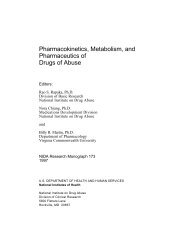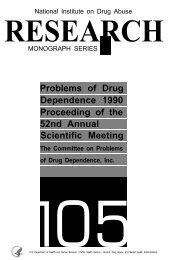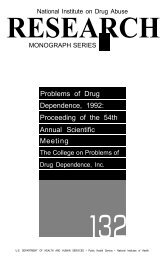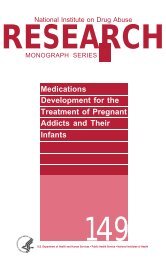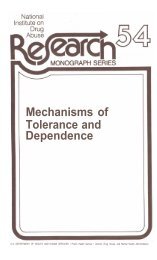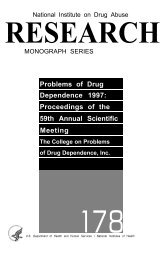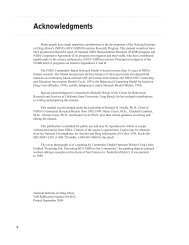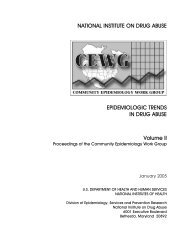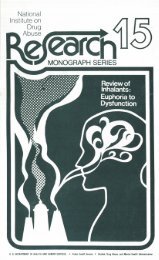The Context of HIV Risk Among Drug Users and Their Sexual Partners
The Context of HIV Risk Among Drug Users and Their Sexual Partners
The Context of HIV Risk Among Drug Users and Their Sexual Partners
You also want an ePaper? Increase the reach of your titles
YUMPU automatically turns print PDFs into web optimized ePapers that Google loves.
variables should be selected <strong>and</strong> studies designed in a manner that allows<br />
results to be used systematically to inform <strong>and</strong> develop a theoretical<br />
framework.<br />
CONTEXTUAL ISSUES SHOULD BE UNDERSTOOD AND<br />
EXAMINED WITH BOTH QUALITATIVE AND QUANTITATIVE<br />
METHODOLOGIES<br />
One <strong>of</strong> the benefits <strong>of</strong> a technical review is that researchers with various<br />
backgrounds <strong>and</strong> perspectives exchange ideas, <strong>and</strong> this process highlights<br />
the complementarity <strong>of</strong> approaches. Quantitative <strong>and</strong> qualitative research<br />
methods are <strong>of</strong>ten presented as opposite ends <strong>of</strong> a continuum, but such a<br />
presentation ignores the fact that they are both methods <strong>of</strong> systematic<br />
inquiry <strong>and</strong> learning whose shared opposite is ignorance. From that<br />
perspective, it becomes incumbent on researchers to use multiple research<br />
approaches to address a problem.<br />
Important concepts in this regard are those <strong>of</strong> “experience near” <strong>and</strong><br />
“experience distant,” terms used by anthropologists to indicate proximity<br />
to the language <strong>and</strong> concepts <strong>of</strong> the observed subject. Experience-near<br />
language, such as backloading, is close to the world view <strong>and</strong><br />
phenomenology <strong>of</strong> the subject, whereas experience-distant language<br />
reflects the observer’s terminology <strong>and</strong> conceptual organization.<br />
Qualitative researchers use these ideas to evaluate how well their<br />
observations reflect the subject’s experiences <strong>and</strong> interpretations <strong>and</strong> not<br />
only the researcher’s views. Ethnographers present at the technical<br />
review stressed the importance <strong>of</strong> experience-near language <strong>and</strong> thinking<br />
in order to clarify contextual issues <strong>and</strong> to raise hypotheses. <strong>The</strong>y also<br />
noted that data provide insights into different levels <strong>of</strong> contextual<br />
determinants. For example, the researcher arrives at different conclusions<br />
if a self-report is taken as objective fact rather than as the subjects’ world<br />
view. People neither recall nor report accurately <strong>and</strong> reliably their<br />
experiences <strong>and</strong> motivations, tending to err in reports <strong>and</strong> to respond to<br />
environmental contingencies, some <strong>of</strong> which they are not aware. <strong>The</strong>y<br />
<strong>of</strong>ten deny the influence <strong>of</strong> stimulus control <strong>and</strong> psychological<br />
motivations that can be objectively related to their behavior (Critchfield<br />
1993; Nisbett <strong>and</strong> Wilson 1977). <strong>The</strong>refore, qualitative <strong>and</strong> quantitative<br />
data both must be carefully examined to determine the realms <strong>of</strong> behavior<br />
<strong>and</strong> context to which they refer.<br />
239



